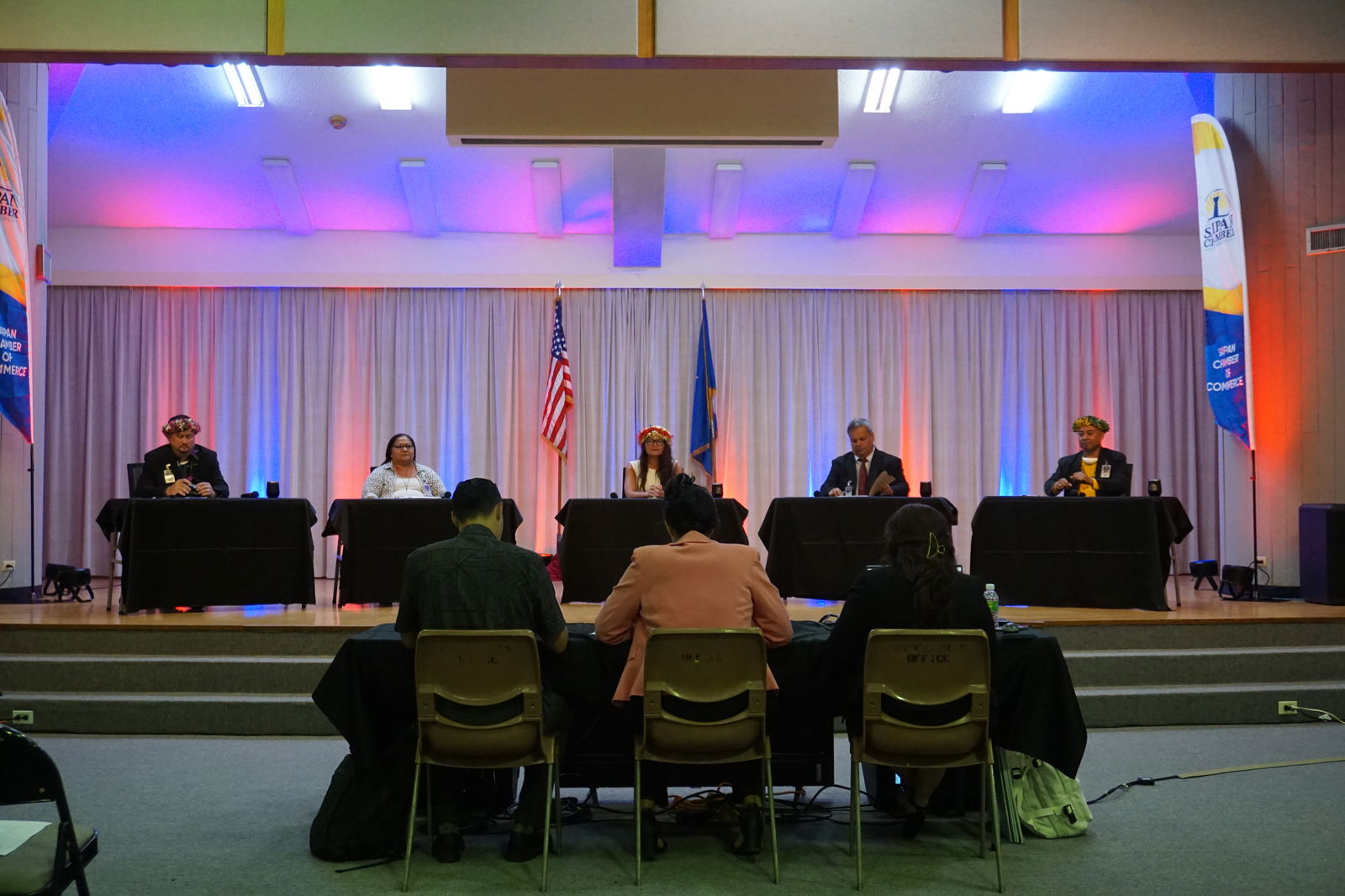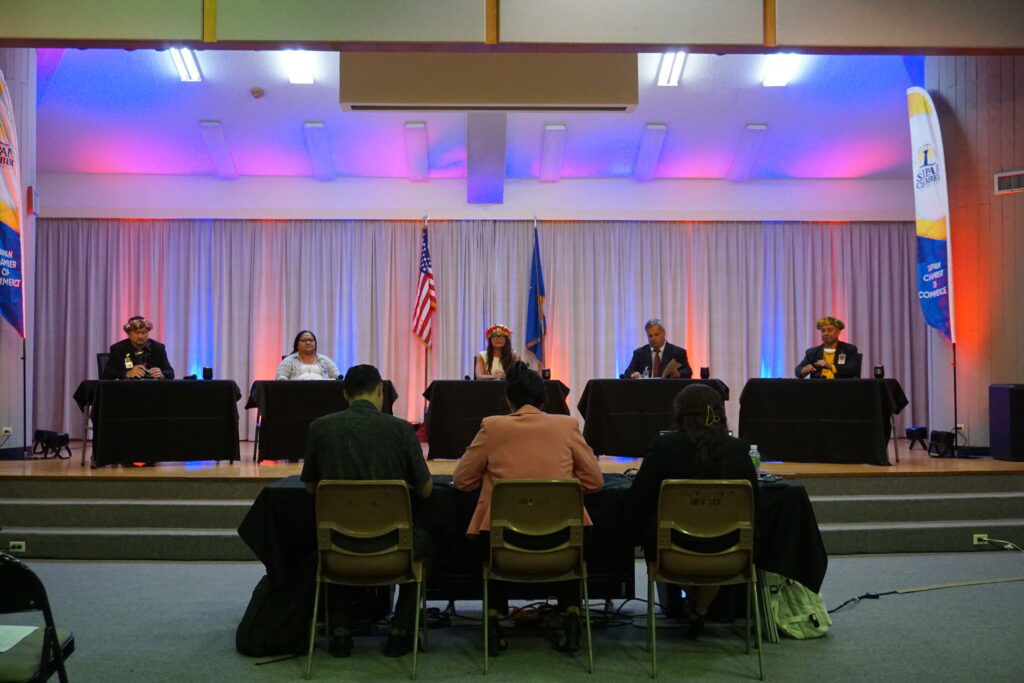AT the Saipan Chamber of Commerce delegate debate, the five candidates shared their ideas on how to solve the pressing issues facing the CNMI’s tourism industry, healthcare services, and other keys concerns.
The debate was held Tuesday evening, Sept. 17 at the multi-purpose center in Susupe, and was attended by dozens of residents and officials.
The candidates are Edwin Propst, Lianna Hofschneider, Kimberlyn King-Hinds, Jim Rayphand and John Gonzales.
The moderator was talk-radio host Catherine Perry. The candidates were not given the questions prior to the debate. Each candidate was given one direct question, and then allowed one minute and 30 seconds to respond. The opposing candidates were given a minute to provide a rebuttal.
Healthcare
When asked what federal policies they would support to “address the challenges related to limited federal funding and training within the local healthcare system,” Hofschneider, a Chamorro rights advocate, said the CNMI has “outgrown” the Commonwealth Health Center.
She said it’s time to have a new hospital in the CNMI. “I would work directly with the Department of Defense to [get a budget] line-item and have a new hospital [with] improved technology and access to quality healthcare.”
An independent candidate, Hofschneider said she would also work with the U.S. Department of Health and Human Services and secure “funding to bail us out.”
King-Hinds, a Republican, said she has consulted with doctors and hospital administrative staff, and supports the lifting of the Medicaid cap.
Currently, “once [the Medicaid cap] runs out we…have to rely on the general fund. We need to expand Medicare eligibility so that more people can afford access to healthcare,” said King-Hinds, a lawyer and former board chair of the Commonwealth Ports Authority.
She also wants to address “high” insurance deductibles.
Rayphand, an independent candidate, also wants to remove the cap on Medicaid funds received by the Commonwealth Healthcare Corp. In addition, he supports the expansion of the Affordable Healthcare Act to the CNMI, with subsidies for employer contributions.
“As a delegate you can work for subsidies to try to offset the employers and make sure that everybody is insured,” said the former director of the Office of Vocational Rehabilitation.
Moreover, he wants “price regulations” for medical services at CHCC.
“We need to be regulating the price structures on medical costs or medical services here,” he said. “We can’t have the hospital charging rates equivalent to the best hospitals in the country and not be able to have the level of service that we’d expect.”
Gonzales, an independent candidate, said he wants to use data to drive healthcare decisions at the federal level.
“We must review and assess the overall cost of medical referrals since ever since to date and use the data to inform us as to what’s the adequate funding to address these costs in the immediate term and to introduce requisite legislation to address that through a policy perspective,” said Gonzales, a freelance business consultant and grants writer.
He would also like to see agreements with hospitals in the Philippines so local patients can receive services there.
For example, he said, a memorandum of understanding with Saint Luke’s Medical Center in Manila could “stretch [our] dollar” enabling the CNMI to “share [funds] with the other patients who are sick.”
A Democrat, Propst said he supports U.S. legislation that would redistribute unused territorial cap amounts under the Medicaid program.
He also supports lifting the cap placed on Medicare.
Propst, who is currently the CNMI House floor leader, said he would work on “obtaining essential medical equipment” for CHCC. He said it was only recently that the CNMI’s only hospital received a new MRI, which was donated by the Leona M. and Harry B. Helmsley Charitable Trust.
He said CHCC “can never turn anyone away” and that “somebody” has to pay for the $10 million-$15 million per year that the hospital incurs in uncompensated healthcare costs.
Propst said he also wants to support Northern Marianas College and CHCC in providing up-to-date medical training, and establishing the CNMI as a “regional hub for healthcare training.”
Tourism, economy
The candidates were asked to discuss how they could use “specific federal initiatives” to “enhance the tourism sector” and “stimulate overall economic development.”
They were likewise asked about the reinstatement of the Annex VI provision of the U.S.-China Air Transport Agreement of July 9, 2007. Reinstating the provision would allow for the resumption of unrestricted scheduled air transportation between China and the CNMI.
King-Hinds said the local economy is “at its best when it’s the tourism industry plus another industry.”
“We saw our economy at its best when we had the tourism industry and the garment industry, and then years later the tourism industry plus the casino industry. Well, all those are gone now,” she said. “The only thing we have left is the tourism industry, and what we’re not doing is doing everything that we can to freely open all access to the markets.”
She supports the reinstatement of Annex VI.
“I’m here to represent the interests of the people of the Commonwealth, not the federal government’s interests to the CNMI. And the people are asking for [Annex VI] to be restored and I will continue to fight until this happens,” she said.
King-Hinds, who is from Tinian, said the military buildup there “is not the answer” to a sustainable economy.
“The military is not an industry. It’s a passing thing. We’re in the construction phase. After that, we don’t know because we don’t have the same situation as Guam,” King-Hinds said. “We need to stop having these conversations that the military is going to fill in these holes and these gaps.”
Rayphand disagreed with King-Hinds, saying that the military in Tinian can “co-exist” with the tourism industry to support the economy.
“Military personal are tourists too,” he said.
Rayphand believes that the tourism industry must be supported by a reduction in the price of travel to the CNMI.
Gonzales called himself the CNMI’s “economy delegate.”
“[I] will relentlessly justify our compelling need for emergency economic and social relief programs to resuscitate and rescue our collapsing economy,” he said.
If elected, he said he wants to invoke Section 904 of the Covenant so the CNMI can be included in “U.S. trade missions and destination branding” to “incentivize American investments” in the Commonwealth.
“We must engage the United States trade representatives in Asia and around the world…so we can incentivize investors to come and set up shop here,” Gonzales said.
As for Annex VI, Gonzales said the “free market enterprise demands” the development of “robust economic systems, policies, [and] regulations.”
He reiterated that under Section 904 of the Covenant, the CNMI could “leverage” its position with the United States.
“Our competitors have hundreds of millions of dollars to promote and brand their destinations. We have pennies in the bucket. We need to do better. We must leverage our United States partner, the Department of Defense, the Department of Commerce, the U.S. Treasury,” he said.
Hofschneider does not support the reinstatement of Annex VI. Instead, she wants the CNMI to pursue a new tourism market.
“I support working in other venues such as Australia, Canada and other allies of the United States,” she said. “There are over 20 bills that are being entertained in the United States Congress regarding China…We cannot be blind [about] this. What we need to do is find another source of tourism, like conferences.”
To stimulate the economy, Hofschneider will “create an institute of volcanology, geoscience, technology and international studies at Northern Marianas College and [transform it]…into a four-year institution so we are able to do all these studies and receive funding through education and scholarship,” she said.
Propst said he would pursue the reinstatement of federal funding under Section 702 of the Covenant.
“At one point we were receiving about 28 million a year through 702 funding,” Propst said. “Adjusted for inflation that would be roughly 58 to 60 million dollars.”
He said such funds could be used to reinvest in infrastructure for the Commonwealth Utilities Corporation.
“This is money we could get and it is money that I will fight for along with our governor and lt. governor,” he said.
Regarding the reinstatement of Annex VI, Propst brought up security concerns regarding China. He said in his meetings with the chiefs of staff of U.S. lawmakers, China was a major concern.
He said the CNMI needs to attract “higher end” tourists and work on its local tourism product.
“We also need to entice tourists that are actually going to spend more and shop at smaller businesses, the mom and pop businesses that are often avoided when many tourists come here,” he said.
Rayphand, for his part, said reinstating Annex VI is worth pursuing because it is supported by the Saipan Chamber of Commerce and the local business community.
However, he finds it “really frustrating that the two people up here who have had seats at the table with the military and congressional staff have opposing perspectives on whether China is a threat or not. I don’t know. I haven’t had [meetings] with the military [or] with congressional staffers yet.”
He called it “painful” that “normal citizens” do not know “where we stand.”
“Ultimately that’s why I want a seat at the table,” he said. “If there’s concern with China, I’ll tell you what that is — if I’m allowed. If there isn’t, I’ll tell you the same.”

The delegate candidates on stage. From left, Edwin Propst, Liana S. Hofschneider, Kimberlyn King-Hinds, James Rayphand and John Gonzales.











